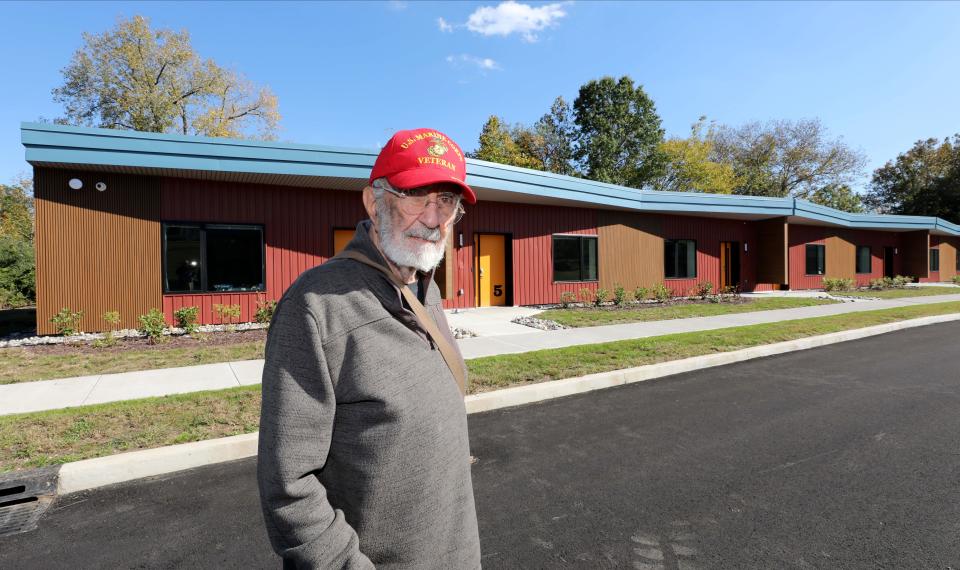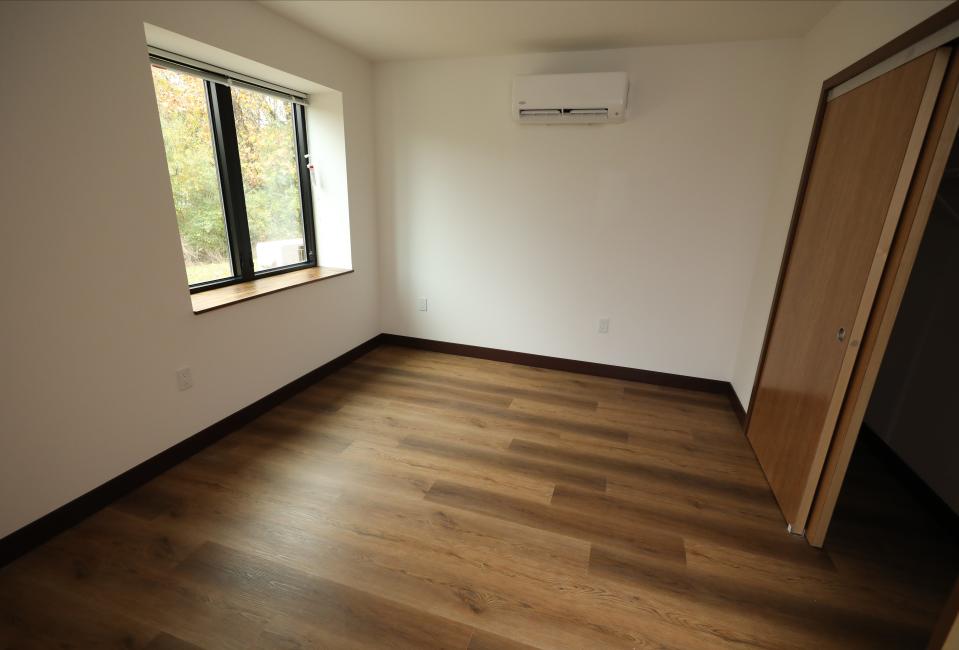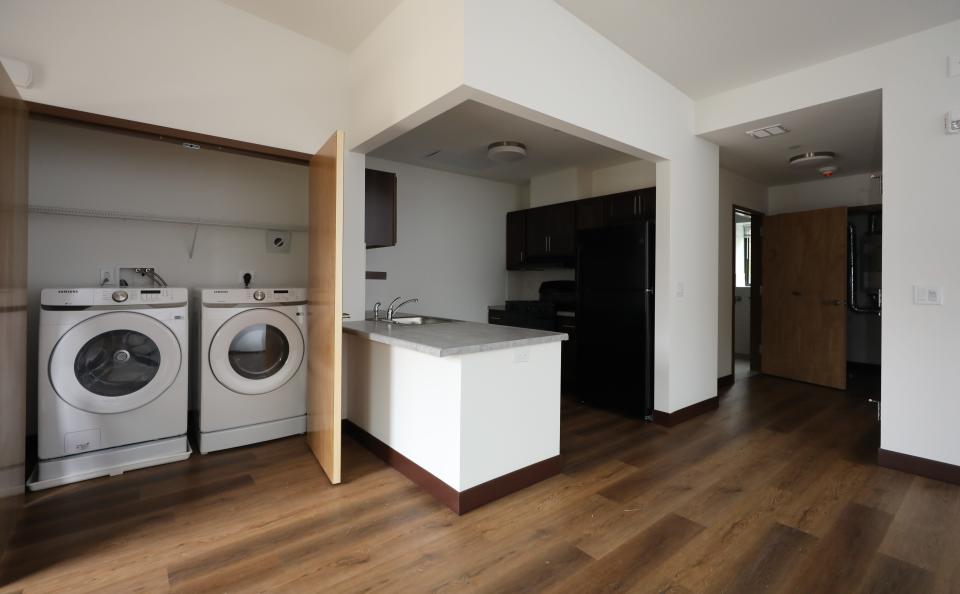Veterans Day: This year, there's help on the home front for Rockland homeless vets
TAPPAN – Soldiers have spent countless anxious nights losing sleep on this stretch of Western Highway in this corner of Rockland County, going back hundreds of years.
George Washington’s soldiers camped here in 1782, waiting for what would follow their decisive win at Yorktown.
Eisenhower’s troops, too, lost sleep here as 1.3 million of them waited to ship out to Europe in World War II, long before most had ever heard of a place called Normandy.
Kennedy, Johnson and Nixon had missile minders keep a round-the-clock watch here, in case a Cold War turned suddenly hot, requiring their Nike missiles to protect New York City from a Soviet air attack.
That historic cycle of sleeplessness is about to come to end, once and for all. Soon, former soldiers will rest easy on Western Highway, their service ended, their victory in another battle secured: Their homeless days will be over.
This Veterans Day, there is hope on the home front for homeless veterans. Rockland Homes for Heroes is readying 14 brand-new, one-bedroom apartments for permanent occupancy on the grounds of the former Camp Shanks, once the largest WWII embarkation port on the East Coast.
Camp Shanks gets a new mission
It’s a project years in the making, the brainchild of John Allen Murphy, a Marine who grew up in the Bronx and served in the Rockland County Legislature for 44 years. Murphy has been a longtime advocate for veterans and those with special needs in the county.
The Loeb House nonprofit he founded has created residential opportunities for the disabled, offering services where there were none, beds where there were none, hope where there was none.

Murphy, serving on various boards, has helped establish residences for people with developmental disabilities, people who are homeless and more folks in need.
"This was my world," he said. "I think in the county my signature is on 500 beds."
Until now, only eight of those beds were set aside specifically for homeless veterans. That number is about to grow.
How did Rockland Homes for Heroes happen?
Here's how Homes for Heroes took shape.
Murphy lived up the street from Western Highway when he learned that the remains of Camp Shanks were being offered for development.
By then, all that was left of the World War II camp was a few rows of single-story offices and classrooms, and huge motor pool buildings along the railroad. The military offered the three-tiered, 15-acre site — sloping down from Western Highway to the tracks — to any nonprofit that would build housing for the homeless on it.
When it was a vision: Rockland Homes for Heroes looks to Phase II
Enter Murphy and Loeb House, which has been creating treatment and supportive residential arrangements since 1982.
Murphy created the Rockland Homes for Heroes nonprofit to transform the top two levels of the property along a road now called “Path of Heroes Way” at the foot of Independence Avenue.
Change, in two phases
Phase 1 opened in 2013, eight apartments for disabled and displaced veterans in two tidy houses along the road.
Five years later, Murphy set his sights on the middle tier of the property, where the low-slung Nike missile headquarters buildings lay fallow, offices and classrooms abandoned on a weed-choked lot under fallen trees.
This Veterans Day, Phase 2 is days away from a ribbon-cutting for 14 one-bedroom apartments where the permanently homeless will find a permanent solution, a life of independent living. Phase II is all but complete, a $6 million project using donated and New York state funds. It awaits a final inspection and the arrival of furniture and finishing touches, Murphy said.
"We saved the foundation, the walls and the roof," Murphy said on a recent tour of the site, walking a freshly paved street lined by neat rows of homes.
Half of the property, on the lowest tier, was donated to the town of Orangetown, which created a pond for wetlands, encircled by a path and named "Homes For Heroes Green Project Walking Trail." (It can be accessed a third of a mile south of Homes for Heroes, at the foot of Bogart Place.)
There have been setbacks. The site lost electricity for a long stretch, putting the project behind. "All the construction's done, but we had no electricity," Murphy said. A recent visit found a crack in a new window.
But the pride of seeing his vision nearly achieved makes Murphy's eyes glisten on an early fall morning.
"It's one of the greatest things I ever did in my life," he said. "To make these homes — I'm going to have 22 homes — I'm thrilled for homeless veterans. And they're permanent homes. Nothing can equal that. Nothing."

Who'll call Homes for Heroes home?
While the contractors and grant makers have been seen to, and the fundraising continues for furniture and home essentials, the only major item on the to-do list is to determine which veterans will call Rockland Homes for Heroes home.
That's where a patchwork of agencies and nonprofits comes in, with referrals, interviews and forms to determine eligibility.
“Rockland County Department of Social Services (does) all the investigation of the legitimacy of the applicants," Murphy said. "They get it from the V.A. and from everywhere. They do all that because they have that apparatus. They do all the investigation for eligibility.”
County spokesperson Beth Cefalu explained that DSS determines whether an applicant is a veteran, homeless and eligible for housing assistance under federal rules.
"If they are, the person is referred to organizations if they qualify and there are openings and assist in arranging for the individual and the providers meet up and interview," she said.
Ultimate placement in Homes for Heroes is not in the county's hands, Cefalu said. "Those decisions are made by providers and the veteran in a joint process."
In this case, the "provider" is Loeb House, whose CEO Tom Zimmerman confirmed that Homes for Heroes builds them and Loeb House will fill them.
Zimmerman said veterans who are referred for Homes for Heroes will be interviewed and will visit the Western Highway site with a Loeb House representative to "decide if Rockland Homes For Heroes is a good placement or if other housing options would be explored."
Those interviews have yet to begin, Zimmerman said.
He pointed to "important contacts" listed on the Homes for Heroes website, including: Joseph P. Dwyer Veteran Peer Support Program, Vet to Vet (845-587-6497); VA Hudson Valley (914-737-4400, ext. 3740); Rockland Veterans Services Agency (845-638-5244).
The VA Hudson Valley, the site says, "works with the Rockland County Department of Social Services to determine eligibility for residency." Rockland's Veterans Services Agency, the site says, "works with the VA and Rockland County Department of Social Services in determining for residency eligibility."

No formal VA role
Cullen Lyons, the public affairs officer for the VA Hudson Valley, pushed back on the way his agency is characterized on the Homes for Heroes website which, he said, "gives the impression that VA Hudson Valley is much more involved than we are."
"We work with the veterans to identify where they would want to go, and this could be an option, it could come up," Lyons said in an interview. "But ultimately, it's the veteran's choice. And then it's the choice of Rockland Homes for Heroes if they take the veterans. Our homeless program coordinator has no idea what their process is for choosing the veterans that go in there, and he's not involved in it."
(Veterans who are homeless or at risk of becoming homeless can contact VA Hudson Valley Health Care System at 914-737-4400 ext. 202022 or call VA’s National Call Center for Homeless Veterans at 1-877-424-3838.)
'Sometimes, we just don't have a good option'
Susan Branham, at Rockland Veterans Services Agency, welcomes homeless vets to her New City office and helps them navigate the forms and programs. She then coordinates with DSS, the VA and WestCOP (the Westchester Community Opportunity Program), which gives temporary financial help and services.
"We all exchange information about, 'This agency can help this person, this agency can't help and how do we get this person immediately housed? How do we get them permanent housing?' Between those three entities, Homes for Heroes might be an option and it might not be."
Branham said a key element to putting a permanent roof over a veteran's head is the HUD-VASH (Veterans Affairs Supportive Housing) voucher, akin to a Section 8 voucher, which pays two-thirds of rent, leaving the veteran to pay one-third. WestCOP can also help secure HUD-VASH vouchers. (Find details on the HUD-VASH program at https://www.va.gov/homeless/hud-vash.asp.)
Once a veteran has a HUD-VASH voucher, their options widen, but it doesn't open all doors, Branham said.
"I have a guy that has been — oh, goodness, months — it has been months because he can't find affordable housing in this area," she said. "He has a HUD-VASH voucher. He's not been able to secure an apartment with it because landlords do not have to take a HUD-VASH voucher, they are not legally obligated to do that. And the market is challenging in Rockland County.
"I've got to be quite honest," Branham said. "Sometimes we just don't have a good option. That's the reality."
Soon, one new option could be Homes for Heroes, said Branham, who once served on the non-profit's board.
"Home for Heroes is permanent housing and that's definitely a need," she said.
Raising money
The fundraising for both projects has occupied the better part of 15 years as Murphy exercised his power of persuasion over local, state and federal lawmakers and bureaucrats. He has had a mantra, one that's emblazoned on the Homes for Heroes website: "They fought for our home. They deserve a home of their own."
Charity groups and volunteers have stepped up. The water company Veolia in August presented Murphy with a check for $15,000.
The latest fundraiser will be 6 to 9 p.m. Nov. 3 at the Pearl River Saloon. A $50 minimum donation is suggested for the event, which will include music, door prizes and appetizers. Proceeds will help to furnish the new apartments in Phase II.
They need couches and chairs and silverware and pots and pans. And, yes, 14 veterans — who will soon have permanent roofs over their heads — will need beds.
Without beds, the sleeplessness could remain a problem on this stretch of Western Highway.
Reach Peter D. Kramer at pkramer@gannett.com. Support reporting like this at www.lohud.com/subscribe.
This article originally appeared on Rockland/Westchester Journal News: Rockland Homes for Heroes to offer new apartments for homeless veterans

